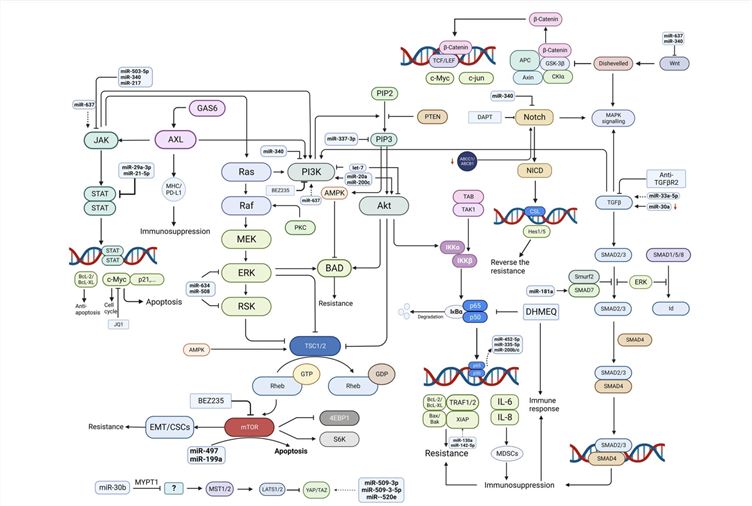Cancer Resistance Mechanism Analysis Services
By understanding how cancer cells become resistant to existing treatments, Creative Biolabs can design new drugs that target these mechanisms and prevent resistance from developing in the first place. We can help identify genetic mutations, gene expression changes, and other molecular alterations that may contribute to cancer resistance.
Introduction
In the fight against cancer, one of the biggest challenges faced by scientists is drug resistance. Cancer resistance mechanisms can be broadly classified into intrinsic and acquired resistance. Intrinsic resistance refers to the inherent characteristics of cancer cells that make them resistant to certain treatments from the beginning. Acquired resistance, on the other hand, develops over time as cancer cells adapt to the therapy being used against them. To gain a deeper understanding of these resistance mechanisms, cancer resistance mechanism analysis services have become an invaluable tool for researchers.
Nowadays, Creative Biolabs offers a comprehensive analysis of cancer resistance mechanisms for a wide range of cancers. Our services include identifying mutations in key cancer genes, analyzing changes in gene expression patterns, and assessing the activation of signaling pathways that are known to confer resistance to therapy.
Moreover, by identifying these resistance mechanisms, we can develop more effective treatment strategies that target the specific vulnerabilities of cancer cells. This personalized approach to cancer therapy holds great promise for improving therapy outcomes and overcoming drug resistance.
 Fig.1 Cancer-associated Signal Pathway Dysregulation Induced miRNA-mediated Resistance.1,2
Fig.1 Cancer-associated Signal Pathway Dysregulation Induced miRNA-mediated Resistance.1,2
Services
At Creative Biolabs, we offer cutting-edge cancer resistance analysis services to help tailor treatment options and improve therapy outcomes.
Our team of experts can analyze the interactions between cancer cells and their surrounding environment to identify key factors contributing to drug resistance. By understanding these mechanisms, we can develop personalized treatment strategies to overcome resistance.
Our advanced analysis techniques can identify the specific pathways involved in cell death resistance, allowing for targeted therapies to be developed to overcome this resistance.
Proteins play a key role in cancer cell survival and drug resistance. By analyzing the expression levels and activity of key proteins involved in resistance, we can pinpoint potential targets for treatment and develop strategies to enhance drug effectiveness.
Oncogenes are another important factor in cancer drug resistance. Our services can identify oncogenes that are driving resistance in cancer cells, allowing for targeted therapies to be developed to inhibit their activity and overcome resistance.
By analyzing the specific signaling pathways that cancer cells use to resist treatment, we can identify potential targets for personalized therapy. Our team of experienced scientists utilizes state-of-the-art technologies to map out these pathways and provide actionable information.
We also offer a unique approach to studying drug resistance in cancer cells. By creating genetically modified cell lines that mimic real-life resistance scenarios, we can test the efficacy of different drugs and combinations, providing valuable data for drug development and treatment optimization.
Why Choose Us?
What sets Creative Biolabs apart from other CRO companies is our commitment to personalized and tailored solutions for each client. Our collaborative approach and attention to detail have earned us a strong reputation in the field, with many clients returning to us for ongoing support and guidance. Furthermore, our analyses can provide real-time data about drug response, allowing for timely adjustments to drug development. As a result, we play a crucial role in advancing novel therapies by offering comprehensive analyses of cancer resistance mechanisms.
-
Multiplatform molecular profiling services for the analysis of resistance mechanisms in cancer;
-
Proprietary technology for non-invasive detection of cancer biomarkers through stool samples;
-
High accuracy rates in distinguishing healthy individuals from those with cancerous lesions;
-
Fully analysis of multiple cancer-related pathways and gene expression patterns;
-
Rapid turnaround time for results delivery.
Case Study
In a new case study, we will explore a research study that investigated the mechanism of cancer resistance through a series of experiments and data analysis.
Design:
Blood samples were collected from a cancer-resistant group and a cancer-susceptible group, and RNA sequencing was performed to analyze gene expression patterns. We also conducted in vitro experiments using cancer cell lines to further investigate the role of specific genes identified in the RNA sequencing data.
Data:
Our RNA sequencing analysis revealed a distinct gene expression signature in the cancer-resistant individuals compared to the cancer-susceptible individuals. Several genes involved in immune response and cell proliferation were found to be upregulated in the cancer-resistant group. In the in vitro experiments, the knockdown of these genes in cancer cell lines resulted in increased sensitivity to chemotherapy and decreased proliferation rates.
Contributions:
1. Identification of a unique gene expression signature in cancer-resistant individuals that may play a role in their ability to resist cancer development.
2. Demonstration of the functional significance of specific genes identified in the RNA sequencing data through in vitro experiments using cancer cell lines.
3. Implications for the development of novel therapeutic strategies for cancer treatment based on targeting the genes and pathways identified in cancer-resistant individuals.
Creative Biolabs offers a range of services to analyze the mechanism of cancer resistance. With our state-of-the-art equipment and advanced methodologies, we can provide you with comprehensive insights into the mechanisms underlying cancer resistance. We are committed to delivering top-notch service and ensuring that you receive the most accurate and reliable results. Trust us to be your partner in understanding and overcoming cancer resistance. Please feel free to contact us or place an order to start uncovering the mechanisms behind cancer resistance.
References
-
Wang, Ling, et al. "Drug resistance in ovarian cancer: from mechanism to clinical trial." Molecular Cancer 23.1 (2024): 66.
-
Image retrieved from Figure 4 "Dysregulation of cancer-associated signal pathway." Wang et al., 2024, used under CC BY 4.0 (https://creativecommons.org/licenses/by/4.0/). The title was changed to "Cancer-associated Signal Pathway Dysregulation Induced miRNA-mediated Resistance."
For Research Use Only | Not For Clinical Use


 Fig.1 Cancer-associated Signal Pathway Dysregulation Induced miRNA-mediated Resistance.1,2
Fig.1 Cancer-associated Signal Pathway Dysregulation Induced miRNA-mediated Resistance.1,2
 Download our brochure
Download our brochure

